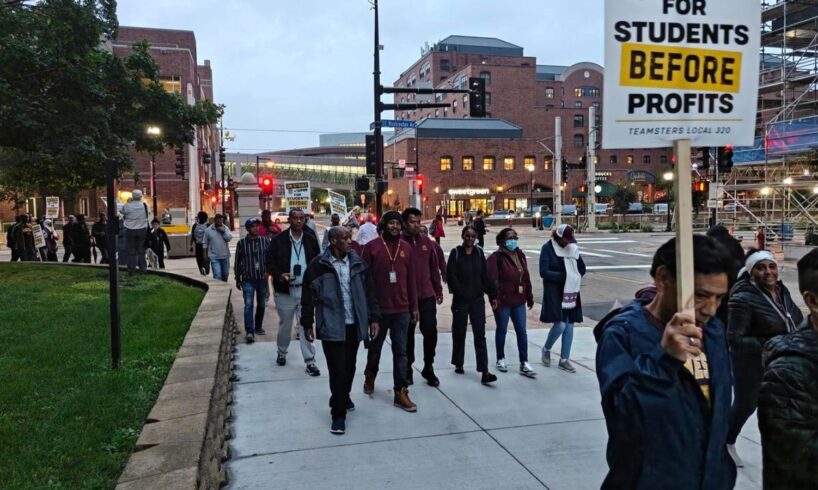
Striking University of Minnesota workers.
More than 1,400 custodians, food service workers, mechanics, gardeners, maintenance and sanitation workers across the University of Minnesota began to strike Monday and Tuesday, reportedly the first walkout since service workers at the school were unionized in the 1970s. The strike follows the rejection of the administration’s so-called “last, best and final offer” by an overwhelming 82 percent of Teamsters Local 320 members on September 5.
The strike began late Monday night at the Crookston and Morris campuses and was joined Tuesday by facilities in Duluth, Grand Rapids, Waseca and Austin, with the flagship Twin Cities campus joining later in the day. University representatives had announced that dining services have been reduced, custodial work curtailed and maintenance requests delayed.
The contract proposed by the university would have provided a 3 percent raise in the first year, 2 percent in the second, along with “market adjustments” ranging between 0.5 percent and 2 percent depending on job category and seniority. In addition, the offer contained a one-time bonus of $1,000. Given the ongoing rise in living costs, higher health insurance premiums, and the broader impact of inflation and tariffs, the deal would have amounted to a cut in real wages. According to Teamsters officials, the average unionized service worker earns just $26.11 an hour, which is below the amount needed to afford a two-bedroom apartment in the Twin Cities.
The walkout at the University of Minnesota is part of a broader resurgence of working class struggle across the United States. It coincides with the strike by 3,200 Boeing defense workers in St. Louis, who are confronting the company’s ruthless strikebreaking operations; the walkout by hundreds of GE Aerospace workers in Cincinnati; and the months-long strike by 130 MercyHealth healthcare workers in Janesville, Wisconsin.
Sam, a striking worker, told the WSWS on the picket lines Tuesday evening that they were fighting for substantially higher wages, increased time off, greater late and early shift premiums, and more. “We’ve asked for a lot of things that don’t seem out of this world at all.”
The strikers faced similar issues as workers in other countries, he said. “It’s the same thing as anywhere else, people here are doing all the work, being paid a meager wage.
“We’re asking for something to just keep up with inflation, but the university is proposing to raise our health insurance premiums by 10 percent. Their initial proposal was a 2 percent raise the first year, 1 percent the second, and then nothing the last half year of the contract.”
The decisive rejection of the contract and the decision to strike reflect growing anger among workers at decades of eroding living standards, as well as increased dissatisfaction with the union apparatus. One worker commented on Facebook: “A 5% raise and the newer workers have to wait for the steps to get 2% of that increase? The Teamsters never did anything about the pay grade steps when they sold them to me after they sold the longer term employees out with the steps in the first place.”
Teamsters 320 had called for a “no” vote on the university’s offer, well aware that it would be massively rejected by the rank and file. Union officials have repeatedly stressed that they had been seeking to avoid a strike, and after workers voted 97 percent to authorize a strike in August, the union abruptly called it off at the last minute, claiming it would “study” the administration’s offer. The apparatus has since declared its willingness to return to the bargaining table if the university agrees to a slightly higher wage proposal, demanding only a 3.5 percent annual increase—far below what is needed for a decent standard of living.
Union officials are undoubtedly already planning to isolate the struggle and shut it down at the earliest opportunity, with a “new” offer which will be virtually indistinguishable from the one workers rejected, continuing the Teamster’s history of betrayals.
The Teamsters General President, Sean O’Brien, has cozied up to and thrown his support behind the would-be dictator Trump, whose policies and administration have declared war on workers, leading to massive cuts to life-saving Medicare and Medicaid programs, as well as attacks on democratic rights and science, to name only a few. Following his appearance at the 2024 Republican National Convention to endorse Trump for president, he also worked to legitimize Trump’s tariffs, claiming they would support union jobs.
The Trump administration is currently occupied with efforts to erect a dictatorship, trampling on laws protecting democratic rights of workers. This offensive was green-lit by the US Supreme Court’s recent decision in Homeland Security v. Lopez, which held that federal immigration officers possess “qualified immunity” even when they openly discriminate on the basis of race or national origin. The ruling explicitly states that “national security considerations may justify racial distinctions” in ICE targeting, effectively legalizing racial profiling. Since the decision, ICE raids have escalated across workplaces. University of Minnesota facilities employ hundreds of immigrant service workers; the court’s ruling places every immigrant member of the bargaining unit in immediate jeopardy, while the Teamsters leadership has issued no plan to defend them.
This is why it is critical that workers take the initiative now to form rank-and-file strike committees under their control. An immediate appeal for support and solidarity actions should be made to students on the campus, as well as other university workers, teachers and nurses throughout the Twin Cities, and beyond.
Workers face a wealthy institution that claims budget constraints even as it sits on an endowment exceeding $6 billion. University President Rebecca Cunningham receives a salary exceeding $1 million, while the administration has already earmarked more than a million dollars to bring in strikebreakers. At the same time, the university has implemented tuition hikes and cutbacks to academic spending.
Workers must take the struggle out of the hands of the bureaucracy and place it directly under rank-and-file control. A crucial part of this entails the building of rank-and-file committees led by the most militant workers to advance the demands of workers. These committees should appeal for support from workers across Minnesota and the United States. Namely, appeals to 3,200 striking Boeing workers, university students and graduate employees for a joint struggle.
The fight at the UMN is not simply over a contract with the UMN; it is a battle over who will dictate the future conditions for service workers: the billionaire-controlled government working to undermine opposition to social inequality and war, or the workers themselves. If workers are to win their demands, it will be done so by a decisive break with the Democrats, Republicans and the system they defend, capitalism.
Sign up for the WSWS Educators Newsletter
Receive news and information on the fight against layoffs and budget cuts, and for the right to free, high-quality public education for all.





